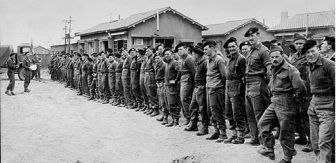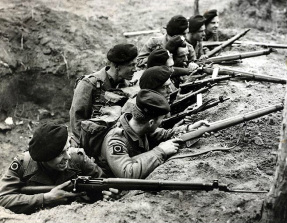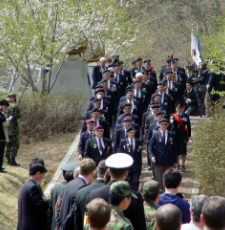from 1951 / Found on the Internet
imagination of the world”, especially the fate of the 1st
Battalion of the Gloucestershire Regiment, which was
outnumbered and eventually surrounded by Chinese
forces on “Hill 235”, a feature which became known as
Gloster Hill. The stand of the Gloucestershire Battalion
together with other actions of 29th Brigade in the Battle
of the Imjin River have become an important part of
British military history and tradition. [Wiki]
April 25th was the day the Battle of Gloster Hill ended in 1951.
There were 700-800 men in the Gloucester [Gloster] Battaltion on April 22nd. By noon April 25th, all but 40-60 (pictured below) were dead or en-route to NK/Chinese POW camps.

who escaped from Gloster Hill [from here]
There is a good write up on the battle here, and a series of posts about its commander, Lt. Col. Carne, here, written at the ROK-Drop blog.
Gloster Hill is near Jeokseong village (적성면) in the Paju region, and is neither easy to find nor easy to get to. The village of Jeokseong [pronounced “Juhk-Suhng”, formerly written as Choksong in English] is a short way north. We got a bus to Jeokseong and walked southeastward to find Gloster Hill. (It is also near a temple and a mountain, and supposedly a waterfall, which I don’t remember seeing).
Here is a Google-map, zeroed-in on the precise spot of today’s ROK/UN/UK flag display that anchors the memorial:
Gloster Hill Memorial Park, 2007 [Wiki]
Another prong of the Chinese offensive caught the British 29th Brigade, attached U.S. I Corps,
by surprise east of Munsan. The Chinese forces isolated Lt. Col. James Carne’s Gloucester
Battalion on a hill near Choksong [Jeokseong], whereupon the British fought like wildcats
for sixty straight hours to defend their perimeter, forging a Korean War legend in the process.
Some 760 of the Gloucester Battalion’s complement of 800 officers and men were killed, wounded,
of captured. Had it not been for the sacrifice of the Gloucesters, the enemy surely would have won
a position from which to threaten the approaches to Uijongbu.
Gen. Paik spent several paragraphs praising the British for their professionalism, also noting that “the British were absolutely devoted to the ritual observance of tea-time. They dropped everything at 4 P.M. to consume tea and cookies, even during combat. British artillery ceased firing for tea-time and then picked up the tempo afterward.”
Idea for a short-story or movie: “Tea-time at Gloster Hill“. A dark-comedy. Setting: British positions on Gloster Hill, April 23rd or April 24th, 1951. Why not?


